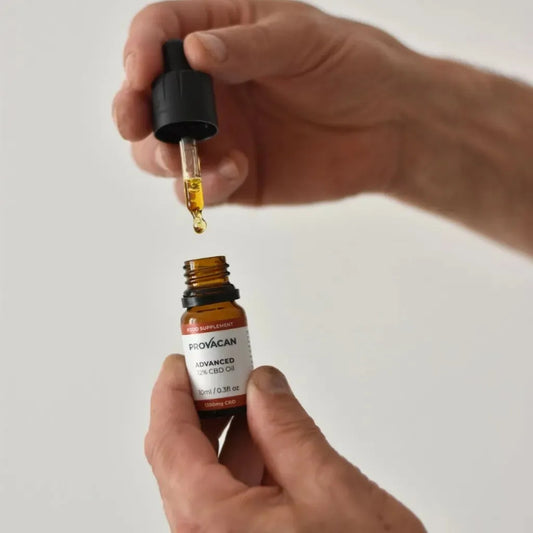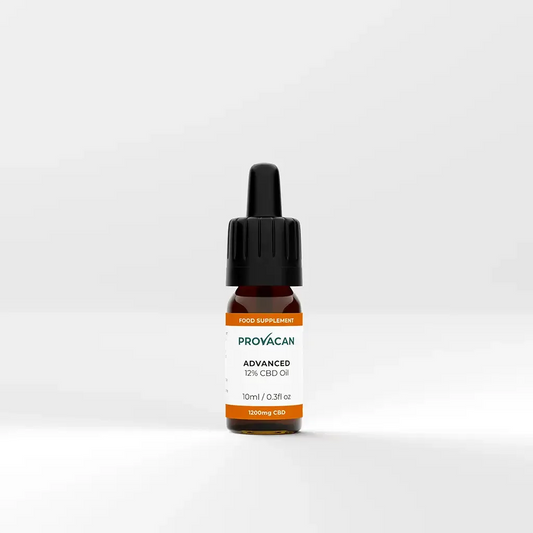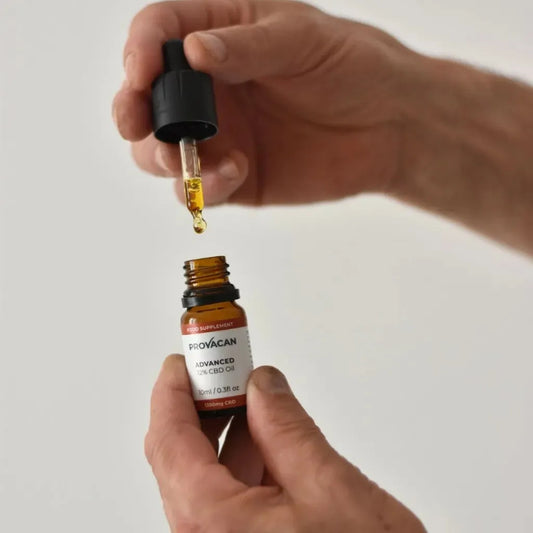Key takeaways:
- Men’s heart health matters more than ever: Cardiovascular disease remains the world’s leading cause of death, but over 80% of cases are preventable. Understanding key risks, such as hypertension, poor diet, and chronic stress, is essential to protect long-term heart health.
- Prevention through lifestyle and targeted supplements: From fibre-rich diets and omega-3s to anti-inflammatory herbs and men’s health supplements like magnesium, B vitamins, and CBD, there are many tools available to support both blood pressure and cholesterol naturally.
- Make heart health a focus beyond Men’s Health Month: Men’s Health Month is the perfect time to prioritise prevention. With personalised support and high-quality heart health supplements, Provacan empowers men to build habits that protect the heart year-round.
June is Men’s Health Month – a timely opportunity to shine a spotlight on some of the key health concerns facing the men in our lives. One of the most critical? Cardiovascular disease.
According to the World Health Organisation (WHO), at least 80% of cardiovascular diseases (CVD), including heart attacks and strokes, are entirely preventable. However, unfortunately, it’s still the leading cause of death worldwide.
At Provacan, we believe it’s time to flip the script. By shining a light on prevention, lifestyle changes, and smart men’s health supplements, we can empower more men to take control of their heart health – before issues arise.
What is cardiovascular disease?
Cardiovascular disease is an umbrella term that refers to disorders of the heart and blood vessels. This includes:
- Atherosclerosis: A buildup of plaque that narrows and hardens the arteries, reducing blood flow.
- Hypertension (high blood pressure): Increased pressure of circulating blood against artery walls.
- Angina: Chest pain caused by reduced blood flow to the heart.
- Heart failure: When the heart can't pump blood efficiently.
- Myocardial infarction (heart attack): Blockage of blood flow to the heart muscle.
- Varicose veins and haemorrhoids: Often overlooked, but part of the vascular spectrum.
While the manifestations vary, they all share a common thread: they place strain on the cardiovascular system, leading to long-term complications if left unmanaged.
Understanding the risk factors for cardiovascular disease
Genetic and biological risk factors
Some CVD risk factors are beyond our control, these include:
- Family history of premature cardiovascular disease
- Genetic variants like MTHFR or ACE polymorphisms
- Ethnicity, with individuals of South Asian or African descent at greater risk
- Gender differences: Men are more likely to have high LDL, also known as "bad" cholesterol, while postmenopausal women are more prone to hypertension
But here’s the hopeful news: lifestyle factors play a far greater role than many realise. Genetics may load the gun, but lifestyle pulls the trigger.
Lifestyle-driven risks
A major contributor to cardiovascular disease is nutrient deficiency – especially B6, B12, and folate – which are critical for regulating homocysteine levels. Homocysteine is a naturally occurring amino acid, but when elevated, it can damage blood vessels and accelerate atherosclerosis.
Other key lifestyle-related culprits include:
- Diets high in sugar, saturated fats, and processed foods
- Low fibre and inadequate omega-3 intake
- Sedentary behaviour
- Chronic stress, which we’ll explore in depth shortly
Together, these elements promote inflammation, disturb lipid balance, and impair vascular function – all of which raise the risk of heart disease.
The cholesterol myth
There’s a common misconception that all cholesterol is “bad.” In truth, cholesterol is essential, especially as we age. It's used to build hormones, maintain brain function, and support cell membranes.
However, imbalanced cholesterol levels - especially elevated LDL and triglycerides – can signal trouble and increase heart health risks. While medication may be necessary for some, preventative lifestyle changes often prove potent in maintaining optimal levels.
| Lipid Measure | Healthy Range |
|---|---|
| Total Cholesterol | Below 5.0 |
| Non-HDL Cholesterol | Below 4.0 |
| LDL Cholesterol ("bad" cholesterol) | Below 3.0 |
| HDL Cholesterol ("good" cholesterol) | Men > 1.0; Women > 1.2 |
| Triglycerides | Fasting < 1.7; Non-fasting < 2.0 |
It’s important to note that what constitutes a "healthy" range can vary slightly from person to person. Testing should always be interpreted in the context of overall health, lifestyle, and personal risk factors.
Hypertension: the silent killer for heart health
Hypertension, or high blood pressure, is one of the most common and dangerous drivers of cardiovascular disease. It’s often called a “silent killer” because it rarely causes symptoms until serious damage has already occurred.
What’s considered high?
In the UK, hypertension is defined as blood pressure consistently over 140/90 mmHg.
Root causes of high blood pressure:
- Low magnesium and potassium, both crucial for vessel dilation and electrolyte balance
- Excessive salt (sodium) intake, especially when potassium is lacking
- Stress, which triggers vasoconstriction via cortisol and adrenaline
- Smoking, which damages the endothelium (inner vessel lining)
- Certain medications, such as corticosteroids, which can elevate BP
Chronic stress and heart health: a modern epidemic
Stress is a natural survival mechanism – but when it becomes chronic, it can wreak havoc on heart health.
Two types of stress:
- Acute stress
- Short-term (e.g. narrowly avoiding a car accident)
- Can be beneficial - boosts focus and reaction time
- Chronic stress
- Ongoing (e.g. job pressure, financial strain)
- Increases the risk of hypertension, inflammation, and heart disease
Under chronic stress, the body remains in a constant “fight or flight” mode. The HPA axis (hypothalamic-pituitary-adrenal) floods the body with cortisol and adrenaline, increasing heart rate, blood pressure, and blood sugar.
Over time, this leads to inflammation, vascular damage, and an increased risk of cardiac events.
10 lifestyle tips to support heart health
5 lifestyle tips to support healthy blood lipid levels
Whether through diet, exercise, or heart health supplements, these habits can help:
-
Moderate alcohol intake
Treat alcohol as an occasional indulgence, not a daily ritual. Some research suggests red wine may support heart health due to compounds like resveratrol, but the risks of excessive alcohol far outweigh the benefits. -
Quit smoking
If you smoke, quitting is one of the most powerful things you can do for your heart. Quitting before age 40 can significantly improve lung and blood vessel function and lower the risk of high blood pressure. -
Boost omega-3s
Include oily fish such as sardines, salmon, and mackerel three times per week, or consider men’s health supplements (but always check in with your doctor before starting). Omega-3s help reduce inflammation and support healthy blood lipid levels. -
Get moving
Aim for a mix of cardio (e.g. cycling, walking, jogging), strength training, and flexibility exercises. Even small daily bursts of movement can make a big difference over time. -
Embrace heart-protective plant compounds
Include foods and herbs rich in anti-atherosclerotic phytochemicals: - Curcumin (turmeric)
- EGCG (green tea)
- Resveratrol (grapes and red wine)
- Naringenin (citrus fruits)
5 Lifestyle tips to support healthy blood pressure
-
Reduce salt intake
Limit processed foods and avoid adding extra salt by using herbs, spices, citrus, and vinegar for flavour, aiming to keep your daily sodium intake below 1,500-2,300 mg. -
Follow a heart-healthy diet
Choose healthy foods for heart health: focus on whole foods like vegetables, fruits, whole grains, legumes, and healthy fats, prioritising potassium-rich options such as bananas, spinach, and sweet potatoes. Consider following the DASH or Mediterranean diet for long-term heart health support. -
Exercise regularly
Aim for 150 minutes of moderate activity per week, such as brisk walking, swimming, or cycling, include strength training twice a week, as regular movement helps lower and stabilise blood pressure. -
Reduce stress
Practice daily relaxation techniques like deep breathing, meditation, yoga, or journaling, prioritise good sleep, social connection, and downtime, since chronic stress is a major contributor to elevated blood pressure. -
Quit smoking & limit alcohol
Stop smoking to reduce artery damage and improve circulation, limit alcohol to no more than one drink per day for women and two for men, as these changes provide both immediate and long-term heart health benefits.
Can CBD support heart health?
The Endocannabinoid System and CBD for men’s heart health
The endocannabinoid system (ECS) plays a regulatory role in mood, inflammation, sleep, and even vascular tone. Research suggests that supporting the ECS with natural compounds – such as CBD (cannabidiol) – may help the body better cope with stress and inflammation.
CBD has been shown to:
- Modulate stress response pathways
- Reduce inflammatory markers
- Support vascular relaxation
- Promote restful sleep, aiding overall recovery and resilience
While more clinical research is needed, early findings are promising, particularly in the context of stress management – an often overlooked piece of the cardiovascular puzzle.
Final thoughts: prevention is power
Cardiovascular disease may be the world’s leading killer – but it’s far from inevitable. By addressing the root causes - from nutrient deficiencies and inactivity to chronic stress – we can turn the tide.
Men’s Health Month deserves to shine a spotlight and make heart health a daily priority, not just a one-month campaign. Whether it’s through smarter nutrition, daily movement, managing stress, or embracing innovative tools like CBD, small steps today can add up to a longer, healthier life tomorrow.
Read also:
- What is andropause? Male menopause symptoms and natural solutions
- What does the Endocannabinoid System do?
- How to determine the right CBD dosage for stress
Sources:
- NHS. Preventing a Heart Attack. https://www.nhs.uk/conditions/heart-attack/prevention/
- World Health Organization (WHO). Cardiovascular Diseases. https://www.who.int/health-topics/cardiovascular-diseases
- GOV.UK. Cardiovascular Disease Prevention: Applying All Our Health. https://www.gov.uk/government/publications/cardiovascular-disease-prevention-applying-all-our-health/cardiovascular-disease-prevention-applying-all-our-health
- UK Health Security Agency (2018). Getting to the Heart of Prevention. https://ukhsa.blog.gov.uk/2018/09/21/getting-to-the-heart-of-prevention/


























